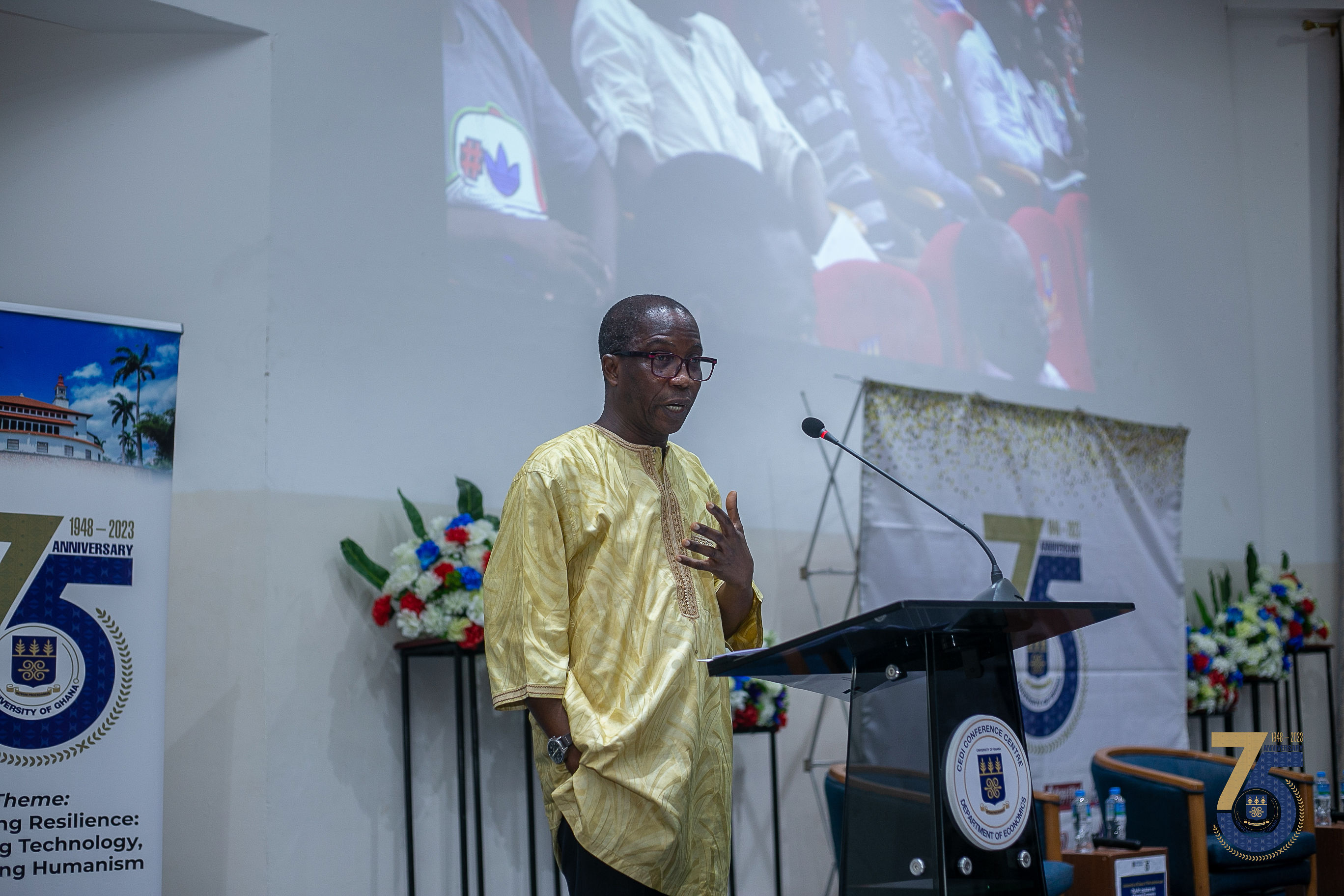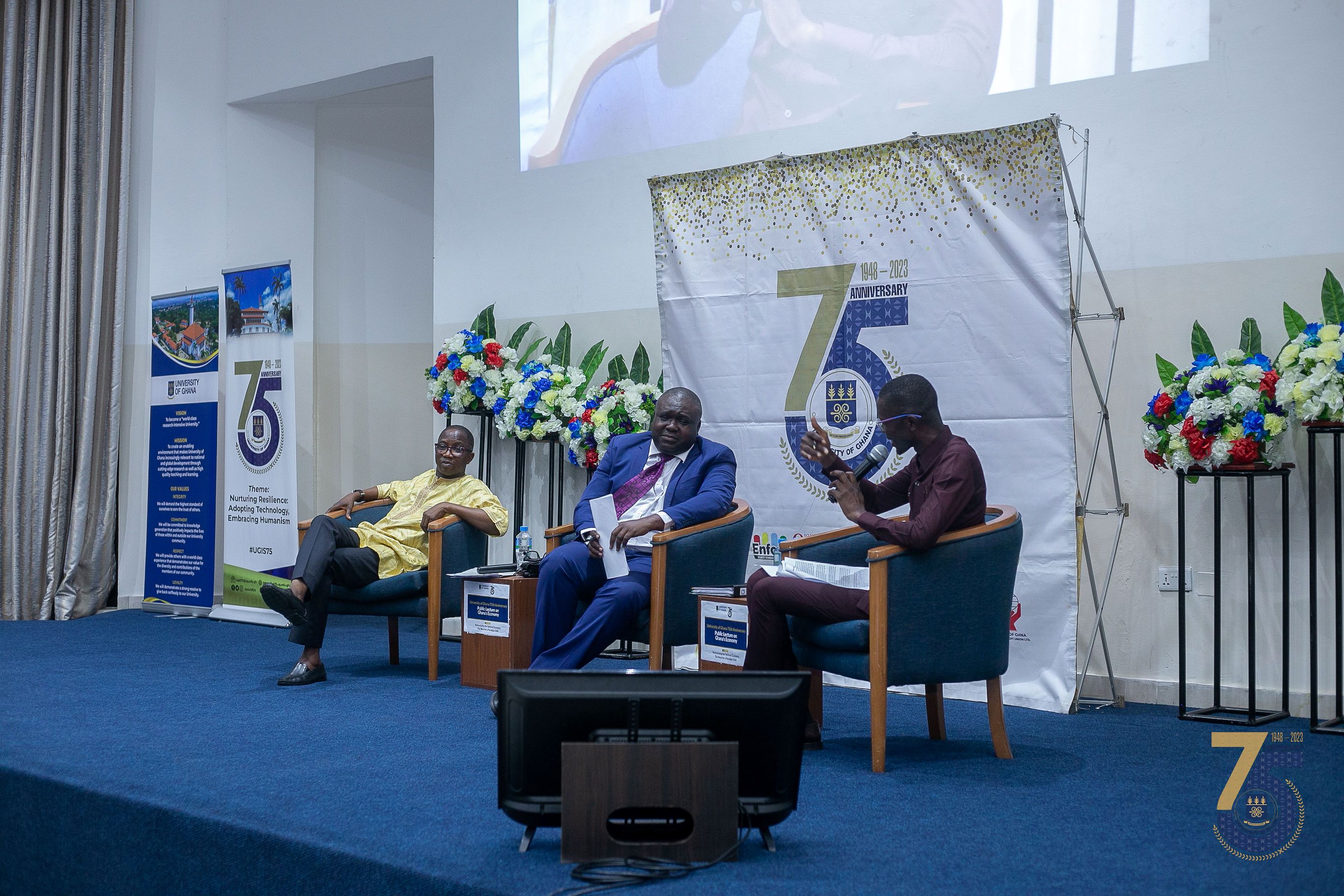



The Coordinator of Pan-African advocacy organisation, Third World Network-Africa, Dr. Yao Graham has blamed Ghana’s economic crisis on the accumulation of economic mismanagement by successive governments and several other underlying economic problems.
He was delivering the 3rd Public Lecture organised by the University of Ghana as part of activities marking its 75th Anniversary.
“We have gone from a country which aspired to be a Ghana beyond aid to being a country which is desperate for aid. There is a widespread destitution as a result of cost-of-living crisis", Dr. Yao Graham said during his presentation.

A cross-section of participants at the Lecture
Stating that the economic crisis cannot be blamed on a single regime, Dr. Graham said that “government after government have seen the problems and addressed it differently and have only succeeded in piling up the country’s debt stock in an attempt to solve the problem.”
He however decried the worsened debt situation of the country and questioned the parameters within which the borrowing was done and how the funds were expended.
Dr. Yao Graham pointed out that, “one of the realities of public finance management in our country is the weak accountability that we have. The crisis of our international finance at the moment is not a single regime problem, it is an accumulative problem. It’s an accumulative problem in two ways. First is the accumulation of the borrowing, and the second is the accumulation of the consequences of the paradigm in which we are operating”.
The Coordinator for the Third World Network-Africa also classified Ghana’s economy as a refurbished primary economy that exports more raw materials than it processes, noting that cocoa, gold, and oil account for more than 80% of the country's raw commodities exported without value addition, with the cyclical effect of the primary commodities market always being felt by the country.

Coordinator for the Third World Network-Africa
He further named the country’s liberalisation of the local market and the high dependence on imports as factors to blame for the country's economic woes.
He expressed worry over the liberalisation of Ghana’s investment space occasioning a high remittance made by international companies in Ghana.
According to him, international trade makes more than 40 percent contribution to GDP, making the country more prone to the volatility of the international market, a situation he notes is acknowledged by governments in Africa, and called for restructuring economies in Africa that are highly import dependent.

A cross-section of participants at the Lecture
Touching on the mismanagement of the country’s natural resources, particularly in the agricultural and extractive sectors, Dr. Graham argued that the agricultural sector has seen less investment in years while the extractive sector has become a zone for patronage and mismanagement.
The public advocacy champion urged the government to prioritise industrialisation as it is an important sector to restructure the economy on the path of sustained growth and development. He called on government and industry leaders to build linkages to connect the country’s economic sectors for sustained growth.
In delivering the opening remarks on behalf of the Vice-Chancellor Prof. Nana Aba Appiah Amfo, Pro-Vice Chancellor (ASA), Prof. Gordon A. Awandare, reckoned that the lecture would highlight the expected actions needed to be taken by key institutions in Ghana's economic sector to enable the country chart a renewed path for economic transformation.

Pro-Vice Chancellor (ASA), Prof. Gordon A. Awandare
The Chairperson for the Lecture, Ms. Abena Amoah, Managing Director of Ghana Stock Exchange, and an Alumna of the University, stated in her remarks that the lecture was timely, given the country’s economic situation.
“The topic for today’s discussion could not have been timelier or more contextual than any other time in our country’s history. Here we stand at the post-pension ripe old age of 66 years old, and our country could hardly be described as self-sufficient, and we are preparing for our seventeenth visit to the IMF for a support program.”
Ms. Abena Amoah, Managing Director of Ghana Stock Exchange,
“The Ghanaian economy has indeed faced a lot of challenges, and in recent years, we have seen high inflation, low productivity, high unemployment rates, poor resource management, and the lack of accountability, among others. These challenges have significantly impacted the growth and development of our economy, leading us further away from our ideal socio-economic environment.”
She expressed the hope that the country’s abundant resources demonstrate the need for the country’s economy and livelihood of citizens to be in a better shape, however, the country is said to be “resource and people rich but cash broke”.
She lauded the University for convening the lecture to draw up solutions that can help the country recover from its economic downturn.
The lecture was followed by a panel discussion, moderated by celebrated Alumnus, Broadcast Journalist, and General Manager of Citi FM & Citi TV, Mr. Bernard Avle with Dr. Philip Abradu-Otoo, Director of Research, Bank of Ghana, and Dr. Priscilla Twumasi Baffour, Senior Lecturer, Department of Economics, UG as discussants.

Dr. Priscilla Twumasi Baffour joined the panel discussion online
Agreeing with points raised by Dr. Yao Graham on the need for value addition to the country’s raw materials before export, Dr. Priscilla Twumasi Baffour, also emphasised the urgent need to take advantage of industrialisation as a focal point of development under the new paradigm of economic growth.
“Ghana's economy has predominately been agriculturally based, but the lack of technological innovation has stifled growth in this area,” she noted.
She lamented how the country’s expenditure has gone up hugely, with taxing of the ordinary Ghanaian becoming the panacea.
Focusing on the response of agitated citizens during economic meltdowns, she advised the government to immediately act, inspite of the economic challenges to address unemployment issues. She asserted that this will curb any potential uprising that is symptomatic of economic meltdowns.

(L-R) Dr. Yao Graham, Dr. Philip Abradu-Otoo, and Bernard Avle during the panel discussion
According to Dr. Twumasi, the country’s dance with the International Monetary Fund is normally traced to expenditures made by governments during electioneering years.
As part of the solutions, she proposed that a return to adopting a long-term national development plan with commitments from both leading parties would help put the country on a solid path for economic growth.
She called for continuous efforts on the part of the major parties and citizens toward rebuilding the economy since it takes more than one administration to successfully build and grow an economy.
Contributing to the discussion, Dr. Philip Abradu-Otoo, in reaction to questions on the attempt by the Bank of Ghana to target inflation persistently, said, “The framework for the inflation targeting undertaken by the central bank was to ensure that inflation rates are kept low to help the economy and citizens.”
He further pointed out that “financing government budget deficits was to help and step in to save the economy that was on the verge of collapse. The action was right to ensure domestic investors had the funds that they would have lost.”
Dr. Abradu-Otoo emphasised that macroeconomic indicators must be strengthened to optimise growth and restore investor confidence in the country.
The public lecture on the economy was on the theme “Restructuring the National Economy: The Need for Paradigm Shift.”

A group photo of dignitaries at the Lecture
There was also an interactive session during which the audience asked questions and contributed to the discussion.
The Ghana Dance Ensemble thrilled participants to an invigorating performance during the programme.
Present at the event were members of UG management, faculty members, deans and directors, representatives of the various political parties, civil society organisations, and students.